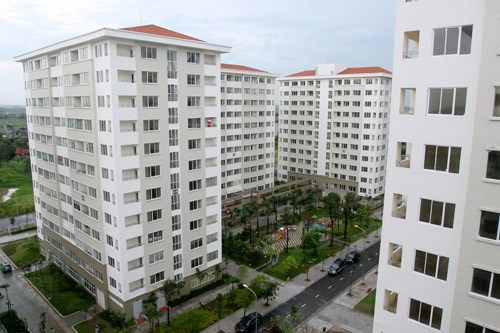State-owned construction firms slow to equitise
State-owned construction companies are making slow progress with privatisation efforts as they have encountered a number of problems, the Ministry of Construction said.
 Illustrative image (Photo:nhadat)
Illustrative image (Photo:nhadat)The ministry said these companies are having difficulty attracting the attention of strategic investors for their IPOs.
Strategic investors are not interested in these companies or in their IPOs, and the State will have difficulty making divestments from these companies, according to the ministry.
There is currently no detailed policy on how State-owned construction companies can sell their stakes to strategic investors. For example, no policies governed the bidding between strategic investors and the selling procedure before and after the IPOs have been released, the ministry added.
Moreover, many companies in the construction sector are unable to sell their brands for equitisation since the Ministry of Planning and Investment has not yet issued a policy on selling company brands following the Resolution 47 issued by the Government last year, the construction ministry said.
In order to improve the equitisation and divestment of state-owned construction companies, the Ministry of Construction recently proposed that the Government should amend Decree 59, issued by the Government in 2011, to allow equitised firms to keep their reverse funds which help them manage the devaluation of receivables and erase the receivables that they can no longer collect.
The ministry also proposed that the Government allow construction firms to use their average profit earned during the 5-10 years before the equitisation as a comparative advantage and allow the employees who represent the company to make investments in subsidiaries and associates and to buy the parent company's shares when it is equitised.
At the moment, these employees are not included in the policy that allows a company's employees to buy its shares at a preferential rate.
The Ministry of Construction also proposed that the Government provide detailed instructions to help investors value unlisted firms, help the firms comply with the market's regulations when they are removed from the exchanges and assist them in seeking strategic investors.
This year, the Ministry of Construction plans to complete equitising 19 firms, including nine parent companies, such as LILAMA, COMA and VICEM and eight of their subsidiaries.
This month, LILAMA, a parent company, is completing the procedures to organise its IPO.
In addition, two other parent companies, CC1 and FICO, submitted their IPO plans to the Government in June of this year, while two more, COMA and VNCC, plan to submit their IPO plans to the Government this month.
Four parent companies, Song Da Corp, VICEM, HUD and IDICO, and HUD's subsidiary – HUDS – are being assessed. They expect to complete the assessments within the third quarter of this year and submit their IPO plans to the Government in the fourth quarter.
Two subsidiaries – the Housing and Urban Services Co Ltd (HUDS) under the Housing and Urban Development Corp (HUD) and Khanh Hoa Housing Development Co Ltd under Song Da Corp – will be equitised separately from their parent companies.
Based on these plans, by the end of this year, 170 subsidiaries will need divesting with a total value of 5.25 trillion VND (233.6 million USD). In August alone, the construction ministry approved the divestment plans proposed by 25 subsidiaries and made complete divestments from 12 of them with a total collection of 200.75 billion VND (8.92 million USD).-VNA













